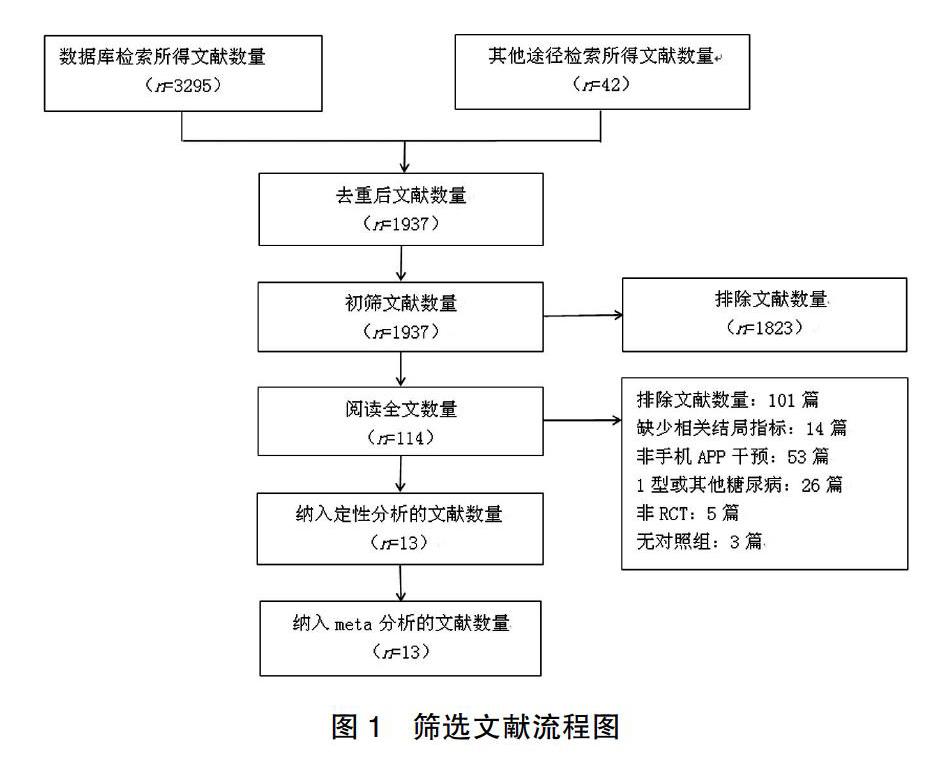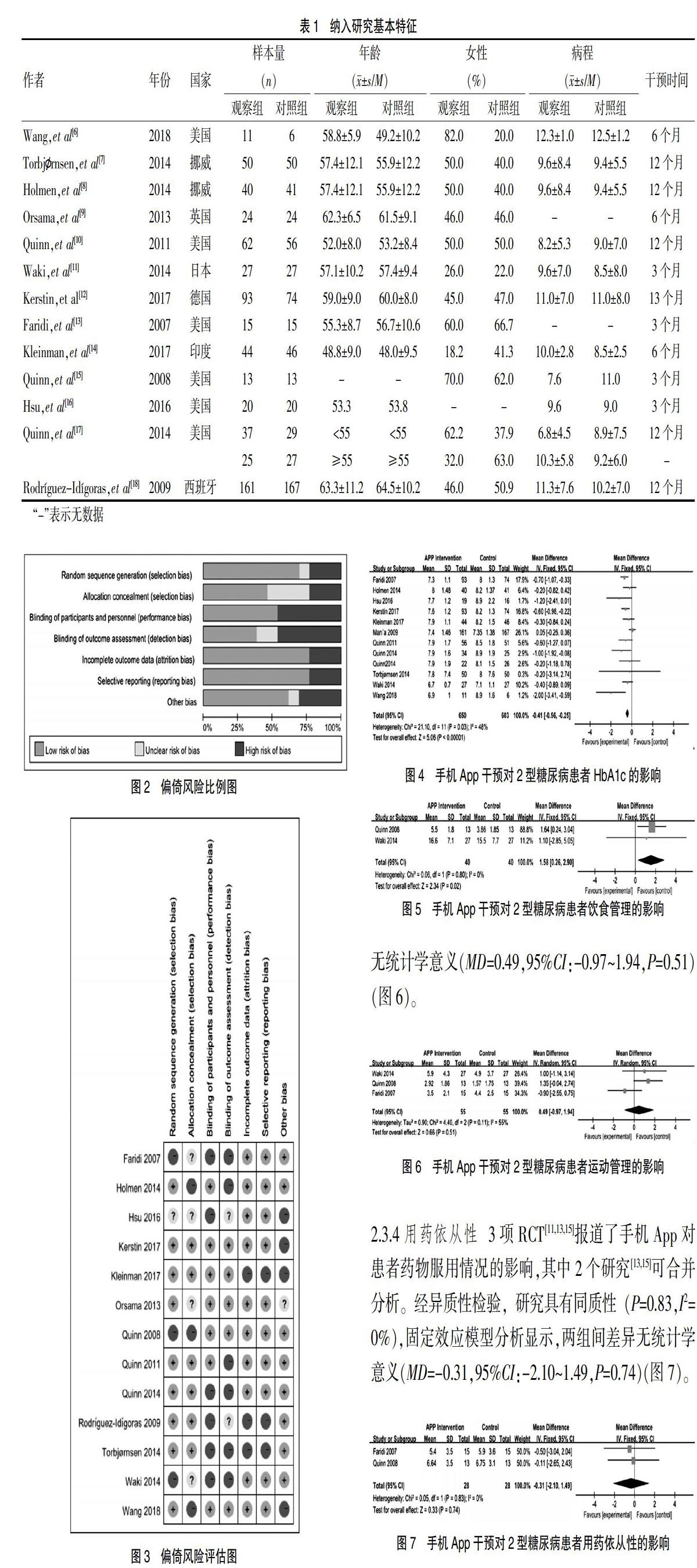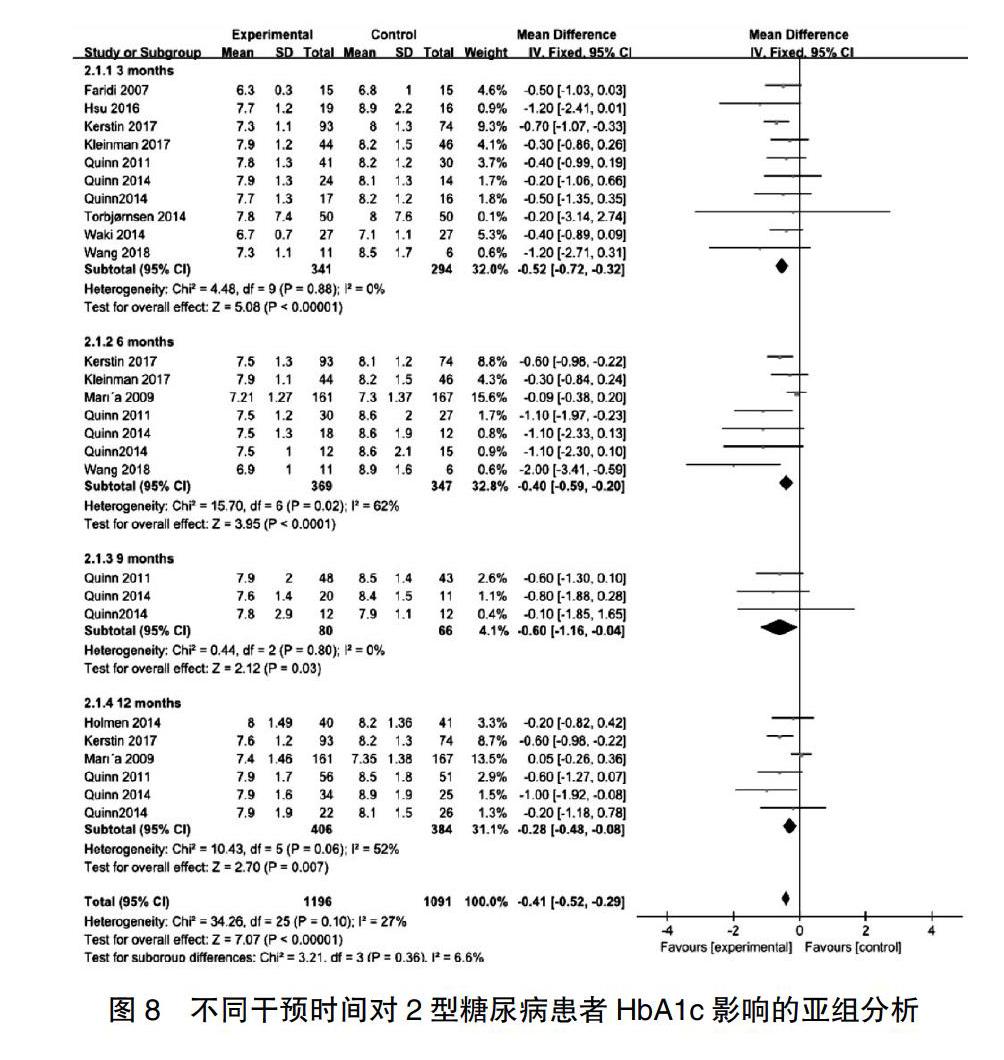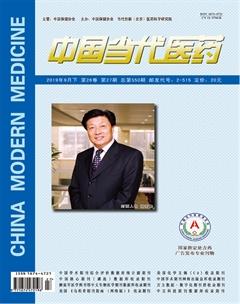手机App对2型糖尿病患者血糖控制和行为管理效果的Meta分析
罗莎 李军文 曹璐璐 文奕 杨俊



[摘要]目的 采用Meta分析方法,综合评价国外应用手机App对2型糖尿病患者进行血糖控制和行为管理的有效性。方法 以英文关键词“type 2 diabetes/T2DM,mobile health/telehealth/mHealth/smartphone,App/application,self-management”检索PubMed,Cochrane Library,Web of Science,OVID,MEDLINE,EMBASE,截止時间为2018年4月28日。采用Revman 5.3进行统计分析。结果 共纳入13项研究,1217例研究对象。Meta分析结果显示,观察组手机App干预后的糖化血红蛋白(HbA1c)水平明显改善(MD=-0.41,95%CI:-0.56~-0.25,P<0.000 01)。手机App对患者饮食管理有较好的作用(MD=1.58,95%CI:0.26~2.90,P=0.02),在患者运动管理和用药依从性方面,手机App的作用并不优于常规护理(MD=0.49,95%CI:-0.97~1.94,P=0.51;MD=-0.31,95%CI:-2.10~1.49,P=0.74)。亚组分析显示,干预3、6、9、12个月时,观察组的HbA1c水平均明显低于对照组(P<0.05),不同干预持续时间比较,差异无统计学意义(P>0.05)。结论 手机App干预能够有效改善2型糖尿病患者的HbA1c水平,但干预持续时间对血糖控制效果没有影响。手机App可提高患者的饮食管理能力,但在运动和用药方面没有明显优势。
[关键词]2型糖尿病;手机App;健康教育;血糖控制;Meta分析
[中图分类号] R587.1 [文献标识码] A [文章编号] 1674-4721(2019)9(c)-0012-05
[Abstract] Objective To comprehensively evaluate the effectiveness of applying mobile App on blood glucose control and behavior management in patients with type 2 diabetes in foreign countries by using Meta-analysis. Methods PubMed, Cochrane Library, Web of Science, OVID, MEDLINE, EMBASE with the keywords as “type 2 diabetes/T2DM, mobile health/telehealth/mHealth/smartphone, App/application, and self-management” were searched. The literature retrieving from these databases were limited to April 28, 2018. Revman 5.3 software was used for statistical analysis. Results A total of 13 studies were included with the involvement of 1217 subjects. Meta-analysis showed that the hemoglobin A1c (HbA1c) level was significantly improved after the intervention of the mobile App in the observation group (MD=-0.41, 95% CI: -0.56: -0.25, P<0.000 01). Mobile App had a good effect on patient diet management (MD=1.58, 95%CI: 0.26-2.90, P=0.02). In terms of patient′s exercise management and medication compliance, the effect of the mobile App was not superior to regular care (MD=0.49, 95%CI: -0.97-1.94, P=0.51; MD=-0.31, 95%CI: -2.10-1.49, P=0.74). Subgroup analysis showed that the HbA1c levels in the observation group were significantly lower than those in the control group after 3, 6, 9, and 12-month intervention (P<0.05), and there was no statistical difference between the different durations of intervention (P>0.05). Conclusion Mobile App intervention can effectively improve glycosylated hemoglobin levels in patients with type 2 diabetes, but the duration of intervention has no effect on glycemic control. The mobile App improves patients′ diet management but has no obvious advantage in exercise and medication.
[Key words] Type 2 diabetes; Mobile App; Health education; Glycemic control; Meta-analysis
糖尿病是影响人类生命健康最常见的慢性疾病之一,国际糖尿病联盟发布的第八版全球糖尿病地图显示,2017年全球糖尿病患者已达4.25亿,其中2型糖尿病占大多数[1]。影响2型糖尿病发展的因素主要与生活方式的变化和饮食习惯有关[2]。通过对糖尿病患者进行生活方式和饮食习惯的调整可有效延缓糖尿病病情的发展,降低相关并发症的发生率[3]。基于“互联网+”的信息技术,如手机App,可通过监测糖尿病患者的血糖、血压、血脂等生化指标以及饮食、运动、用药等情况,帮助患者改善生活方式,降低糖化血红蛋白(HbA1c)水平[4-5]。本研究对国外应用手机App对2型糖尿病患者进行干预的临床随机对照试验进行系统评价和Meta分析,旨在评估手机App对2型糖尿病患者的血糖控制和行为管理的应用效果,为临床更好地应用手机App进行健康教育提供参考依据。
1资料与方法
1.1 检索策略
采用关键词与主题词相结合的方式,以英文关键词“type 2 diabetes/T2DM,mobile health/telehealth/mHealth/smartphone,App/application,self-management”檢索PubMed,Cochrane Library,Web of Science,OVID,MEDLINE,EMBASE,截止时间为2018年4月28日。
1.2 文献纳入和排除标准
按照PICOS原则选择应用手机App对2型糖尿病患者进行健康管理的临床随机对照试验。
纳入标准:①研究对象,符合2型糖尿病诊断标准的成年患者(≥18岁);②干预措施,观察组采用手机App进行健康管理,可以启用远程监测和提供临床意见功能;对照组采用常规健康教育方法(纸张教育材料,面对面的自我管理教育等);③结局指标,HbA1c及饮食、运动、用药依从性等糖尿病患者行为管理指标,报道了以上其他任一项的文献均纳入研究。
排除标准:①非2型糖尿病;②基本信息不全;③非临床随机对照试验或未设置对照;④重复发表。
1.3 质量评价及资料提取
采用Cochrane 5.1.0版手册评价纳入研究的偏倚风险。由两名经过统一培训的研究者分别独立完成,对最终结果进行讨论并得到解决。制定纳入研究基本特征表,对纳入的研究进行资料提取,主要包括研究的作者、发表年份、样本量、分组信息、病程、干预方法、结局指标、干预时间等。
1.4 统计学方法
采用Revman 5.3软件进行Meta分析。异质性分析采用I2检验。若P≥0.10,I2≤50%,则各研究间具有同质性,选用固定效应模型;若P<0.10,I2>50%,则具有异质性,选用随机效应模型。连续变量采用均数差值(MD),二分类变量采用比值比(OR)进行效应量合并。
2结果
2.1文献筛选结果
初步检索出3295篇题目和摘要,通过其他途径获得42篇文献,经Endnote X7去重后余1937篇。阅读题目和摘要后剩114篇,阅读全文后最终纳入13项RCT[6-18](图1)。纳入的13项RCT中,观察组622例,对照组595例。纳入研究基本特征见表1。
2.2纳入研究偏倚风险评估
根据Cochrane网推荐的偏倚风险评估工具,纳入研究的基线资料具有可比性。其中有10项RCT[6-10,12,14-15,17-18]采用了随机序列生成,6项RCT [7,10,12,14,17-18]阐明分配隐藏,7项RCT[6,8-10,12,14-15]对研究对象和研究者采用盲法,其中5项RCT[6,9,12,14-15]进行了详细报道。3项RCT[7,14,18]报道了不完整的结果数据(图2、图3)。
2.3 Meta分析结果
2.3.1 HbA1c 所有研究均报道了手机App干预后HbA1c的情况,其中11项RCT[6-8,10-14,16-18]可进行合并分析,其中一个研究[17]按年龄≥55岁与<55岁分层抽样,均纳入分析。经异质性检验,各研究具有较小的异质性(P=0.03,I2=48%),固定效应模型分析显示,应用手机APP干预后,观察组患者的HbA1c水平明显低于对照组(MD=-0.41,95%CI:-0.56~-0.25,P<0.000 01)(图4)。
2.3.2饮食管理 3项RCT[11,13,15]报道了患者的饮食管理结局指标,其中2个研究[11,15]可合并效应量进行Meta分析。经异质性检验,研究具有同质性(P=0.80,I2=0%),采用固定效应模型分析,结果显示观察组在饮食自我管理方面优于对照组(MD=1.58,95%CI:0.26~2.90,P=0.02)(图5)。
2.3.3运动管理 3项RCT[11,13,15]报道了患者的运动管理情况,经异质性检验,研究间存在中度异质性(P=0.11,I2=55%),随机效应模型分析显示,两组间差异无统计学意义(MD=0.49,95%CI:-0.97~1.94,P=0.51)(图6)。
2.3.4用药依从性 3项RCT[11,13,15]报道了手机App对患者药物服用情况的影响,其中2个研究[13,15]可合并分析。经异质性检验,研究具有同质性(P=0.83,I2=0%),固定效应模型分析显示,两组间差异无统计学意义(MD=-0.31,95%CI:-2.10~1.49,P=0.74)(图7)。
2.3.5亚组分析 由于纳入研究间干预时间不同(3~12个月),因此对干预时间进行亚组分析,结果显示,在干预3、6、9、12个月时,观察组的HbA1c水平均明显低于对照组(P<0.05),不同干预时间比较,差异无统计学意义(P>0.05)(图8)。
3讨论
3.1手机App对2型糖尿病患者HbA1c的影响
本研究结果显示,从整体来看,手机App有助于改善2型糖尿病患者的血糖水平。采用手机App对患者进行干预后,其HbA1c平均水平降低了0.41%,效果明显优于对照组(P<0.05)。这与Cui等[19]的研究结果一致。通过网络与糖尿病患者进行沟通交流、对患者提供的情况给予信息反馈、督促患者更好地进行自我管理后,HbA1c水平明显降低[20]。Greenwood等[21]纳入25项采用移动应用程序干预糖尿病患者代谢指标监测、饮食、运动等方面的研究进行系统评价,结果显示,通过移动应用程序接受自我管理方案的患者HbA1c水平显著减低。
亚组分析显示,经过3、6、9和12个月的手机App干预后,观察组的HbA1c水平低于对照组,差异有统计学意义(P<0.05)。而干预的持续时间对血糖控制没有影响。这一发现与另一项研究结果不同。Fan等[22]的研究显示,较长时间的干预通常会产生比较短期干预更大的影响。而本研究结果提示,短期干预的效果与长期干预的效果相似。因此,在帮助2型糖尿病患者通过手机App进行健康管理时,健康专业人员可以采取短期强化干预措施,帮助患者形成健康的行为方式,培养良好的生活习惯,患者也可以通过手App提出任何问题,或者以门诊、电话等形式咨询医务人员,从而有效提高工作效率,节省社会资源。
3.2手机App对2型糖尿病患者行为管理的影响
患者自我管理是患者根据医务人员传授的知识和技能,进行治疗、行为和环境方面的调整,是患者改善健康行为的主要途径之一。本研究结果显示,手机App干预后,观察组患者的饮食管理行为能力优于对照组(P<0.05)。这与其他研究结果相似[23]。提示应用手机App健康教育可以改善2型糖尿病患者饮食方面的自我管理水平。但两组患者在运动管理和用药依从性方面的差异无统计学意义(P>0.05),这与Weegen等[24]的研究结果不一致。其研究显示,手机App组每天体力活动为11.73 min,而对照组为9.41 min,两组之间存在统计学差异。原因可能是纳入研究样本量偏小导致了阴性结果的出现。
3.3研究的局限性
有许多限制条件可能会影响本研究的结果:①仅检索了公开发表的文献,未对灰色文献进行检索,可能会存在发表性偏倚;②仅检索了英文文献,可能錯失其他语种发表的研究结果;③虽然纳入的所有研究都是随机对照试验,但并不全是双盲;④纳入的许多研究缺乏患者药物依从性、生活方式改变的信息,限制了手机App对2型糖尿病患者自我管理的作用理解。
综上所述,手机App能够有效改善2型糖尿病患者HbA1c水平,提高患者饮食行为管理能力,但是对运动管理和用药依从性等没有明显的作用。在未来的研究中,应该研究出更多元化、更智能化、更便捷的手机App,进一步探讨手机App对2型糖尿病患者生化指标和自我行为管理能力的作用及影响。
[参考文献]
[1]IDF DIABETES ATLAS-8TH EDITION:http://diabetesatlas.org/resources/2017-atlas.html
[2]Rafael H.Etiology and pathophysiology of type 2 diabetes mellitus[J].Revista Mexicana De Cardiologia,2011,22(1):39-43.
[3]Lakerveld J,Bot SD,Chinapaw MJ,et al.Motivational interviewing and problem-solving treatment to reduce type 2 diabetes and cardiovascular disease risk in real life:a randomized controlled trial[J].Int J Behav Nutr Phys Act,2013,10(1):47.
[4]Griauzde DH,Kullgren JT,Liestenfeltz B,et al.A mobile phone-based program to promote healthy behaviors among adults with prediabetes:study protocol for a pilot randomized controlled trial[J].Pilot Feasibility Stud,2018,4(1):48.
[5]Desveaux L,Shaw J,Saragosa M,et al.A mobile app to improve self-management of individuals with type 2 diabetes:qualitative realist evaluation[J].J Med Internet Res,2018,20(3):e81.
[6]Wang J,Cai C,Padhye N,et al.A behavioral lifestyle intervention enhanced with multiple-behavior self-monitoring using mobile and connected tools for underserved individuals with type 2 diabetes and comorbid overweight or obesity:pilot comparative effectiveness trial[J].JMIR Mhealth Uhealth,2018,6(4):e92.
[7]Torbj rnsen A,Jenum AK,Smastuen MC,et al.A low-intensity mobile health intervention with and without health counseling for persons with type 2 diabetes,part 1:baseline and short-term results from a randomized controlled trial in the Norwegian part of renewing health[J].JMIR Mhealth Uhealth,2014,2(4):e52.
[8]Holmen H,Torbj rnsen A,Wahl AK,et al.A mobile health intervention for self-management and lifestyle change for persons with type 2 diabetes,part 2:one-year results from the Norwegian randomized controlled trial renewing health[J].JMIR Mhealth Uhealth,2014,2(4):e57.
[9]Orsama AL,Harno K,Kulju M,et al.Active assistance technology reduces glycosylated hemoglobin and weight in individuals with type 2 diabetes:results of a theory-based randomized trial[J].Diabetes Technol Ther,2013,15(8):662-669.
[10]Quinn CC,Shardell MD,Terrin ML,et al.Cluster-randomized trial of a mobile phone personalized behavioral intervention for blood glucose control[J].Diabetes Care,2011,34(9):1934.
[11]Waki K,Fujita H,Uchimura Y,et al.DialBetics:a novel smartphone-based self-management support system for type 2 diabetes patients[J].J Diabetes Sci Technol,2014,8(2):209.
[12]Kerstin K,Altpeter B,Berger J,et al.Efficacy of the telemedical lifestyle intervention program TeLiPro in advanced stages of type 2 diabetes:a randomized controlled trial[J].Diabetes Care,2017,40(7):863-871.
[13]Faridi Z,Liberti L,Shuval K,et al.Evaluating the impact of mobile telephone technology on type 2 diabetic patients′ self-management:the NICHE pilot study[J].J Eval Clin Pract,2008,14(3):465-469.
[14]Kleinman NJ,Shah A,Shah S,et al.Improved medication adherence and frequency of blood glucose self-testing using an m-health platform versus usual care in a multisite randomized clinical trial among people with type 2 diabetes in India[J].Telemed J E Health,2017,23(9):733-740.
[15]Quinn CC,Clough SS,Minor JM,et al.WellDoc mobile diabetes management randomized controlled trial: change in clinical and behavioral outcomes and patient and physician satisfaction[J].Diabetes Technol Ther,2008,10(3):160-168.
[16]Hsu WC,Lau KH,Huang R,et al.Utilization of a cloud-based diabetes management program for insulin initiation and titration enables collaborative decision making between healthcare providers and patients[J].Diabetes Technol Ther,2016,18(2):59-67.
[17]Quinn CC,Shardell MD,Terrin ML,et al.Mobile diabetes intervention for glycemic control in 45- to 64-Year-Old persons with type 2 diabetes[J].J Appl Gerontol,2014,35(2):227.
[18]Rodríguez-Idígoras MI,Sepúlveda-Munoz J,Sánchez-Garridoe-Ecudero R,et al.Telemedicine influence on the follow-up of type 2 diabetes patients[J].Diabetes Technol Ther,2009,11(7):431-437.
[19]Cui M,Wu X,Mao J,et al.T2DM self-management via smartphone applications:a systematic review and meta-analysis[J].PLoS One,2016,11(11):e0166718.
[20]Pal K,Eastwood SV,Michie S,et al.Computer-based interventions to improve self-management in adults with type 2 diabetes:a systematic review and meta-analysis[J].Diabetes Care,2014,37(6):1759.
[21]Greenwood DA,Gee PM,Fatkin KJ,et al.A systematic review of reviews evaluating technology-enabled diabetes self-management education and support[J].J Diabetes Sci Technol,2017,11(5):1015-1027.
[22]Fan L,Sidani S.Effectiveness of diabetes self-management education intervention elements:a meta-analysis[J].Can J Diabetes,2009,33(1):18-26.
[23]Doocy S,Paik KE,Lyles E,et al.Guidelines and mhealth to improve quality of hypertension and type 2 diabetes care for vulnerable populations in lebanon:longitudinal cohort study[J].JMIR Mhealth Uhealth,2017,5(10):e158.
[24]Weegen SVD,Verwey R,Spreeuwenberg M,et al.It′s life! mobile and web-based monitoring and feedback tool embedded in primary care increases physical activity: a cluster randomized controlled trial[J].J Med Internet Res,2015, 17(7):e184.
(收稿時间:2019-04-04 本文编辑:闫 佩)

